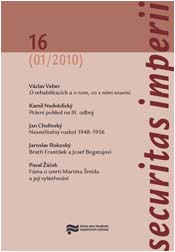Právní pohled na III. odboj
A legal view of the “Third (anti-communist) Resistance“ movement
Author(s): Kamil NedvědickýSubject(s): Law, Constitution, Jurisprudence, Human Rights and Humanitarian Law, Studies in violence and power, WW II and following years (1940 - 1949), Post-War period (1950 - 1989), History of Communism
Published by: Ústav pro studium totalitních režimů
Keywords: anti-communist resistance movement; law; historical development; analysis
Summary/Abstract: In this paper, the author deals with the legal contexts of anti-communist resistance (known as the “Third Resistance” in the Czech Republic). He first describes the historical development of the right to resist tyranny, the opinions of philosophers and legal theorists from various cultural spheres on the struggle against usurpers, and the gradual entrenchment of these theories into binding legal codifications. Furthermore, he devotes space to breaches of the rights and freedoms of Czechoslovak citizens after the communist putsch in February 1948. He demonstrates the illegality of the subsequent regime, using, as an example, the new constitution and its violation in practice, which was justified by ideological argumentation. He also analyses several laws that were intended to consolidate the rule of the Czechoslovak Communist Party and which concerned legalised injustice. He assesses the impact of the concept of class in the application of the law, which he identifies as “class racism”. This in itself is a reason for exercising the right to resist. He draws attention to the broad interpretation of the concept of “class enemy” and the enormous extent of the repression connected with this. Other circumstances that cannot be omitted include the role of unconstitutional institutions like the so-called “Security Fives” (Bezpeč- nostní pětky), which were set up to pursue enemies of the regime, and the influence of Soviet advisors. The illegitimacy of the communist regime is demonstrated by the impossibility of changing the government by legal means, i.e. the non-existence of free elections, which are a defining characteristic of a democratic system. The author highlights the fact that violence and oppression can be described as the basic premise of communist doctrine in terms of how a society should be governed. The illegal actions of the security services, a judiciary that was completely subordinate to Party bodies, the establishment of the Iron Curtain, and state-sponsored repression meant that people were forced to either submit, or to expose themselves and those close to them to the risk of punishment. Consequently, the only alternative available for defending oneself against the terror of the governing Czechoslovak Communist Party was to resist, in all the comprehensively specified meanings of this word, including armed resistance. The author identifies the emergence of the “Third Resistance” as a legitimate response provoked by an oppressive regime. The text also looks at the context of the times, i.e. the Cold War, which was in danger of becoming “hot” and the position of anti-communist resistance fighters facing the reality of a bipolar world. Attention is also devoted to so-called “socialist legality”, which did not change the essence of the illegitimate communist system of government, because it was constructed with the aim of serving this system. The dictatorship of the proletariat and the propagation of the idea that “class enemies” had no human rights and freedoms (including the most basic ones) found their justification in the regime’s jurisprudence. The study also looks at the international context, when it describes the consequences of the Second World War and the enshrinement of a catalogue of rights and freedoms in documents that were binding for the entire planet. Emphasis is placed on the impact of the Universal Declaration of Human Rights as well as on the importance of the Charter of the International Military Tribunal in Nuremberg for defining crimes against humanity and the possibility of a comparison with states where a democratic legal state was in operation in the same period. As regards the issue of evaluating the “Third Resistance” after 1989, the author expresses his opinion on the inappropriateness of legal continuity, which he illustrates by outlining a possible different approach. He stresses the important influence of personal factors in the new regime’s acceptance of pre-November-1989 law and describes the complications that this fact causes in relation to the “Third Resistance”. He cites several examples where juristic theory itself contradicts or criticises continuity. He analyses several new regulations, such as Act No. 119/1990 of the Collection of Laws (Coll.), on judicial rehabilitations, and Article 23 of the Charter of Fundamental Rights and Basic Freedoms. He deals with the basic enshrinement of the communist regime’s illegitimacy and the acknowledgement that resisting and revolting against this regime was justified in Act No. 198/1993 Coll., on the illegality of the communist regime and on resistance to this regime. He also mentions an important judgment of the Constitutional Court (No 14/1994 Coll.), dated 21 December 1993, and its impact on the legal interpretation of the period 1948-1989. He cites other Constitutional Court judgements concerning the fight against the totalitarian government of the Czechoslovak Communist Party, and claims that it would be appropriate to adopt a law that is being considered with regard to participants in the anti-communist resistance movement and those who participated in defying communism, when he puts forward a comparison with legislation in the Slovak Republic. He concludes that the legislative enshrinement of resistance to communist totalitarianism is important, not just for coming to terms with the past but also for the future. He also looks at the issue from an international perspective. In conclusion, the author deals with the topicality of the given issue in both the Czech Republic and throughout the world. In view of the evidence cited in the text, he deduces that anti-communist resistance was both legitimate and honourable.
Journal: Securitas imperii
- Issue Year: 2010
- Issue No: 16
- Page Range: 30-50
- Page Count: 21
- Language: Czech

